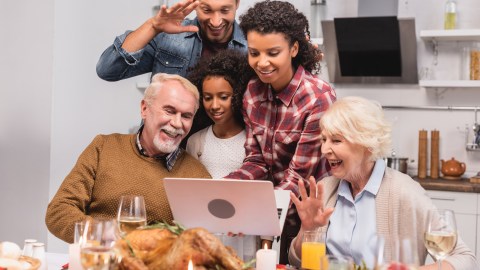Experts fear Thanksgiving COVID spikes—Can you have your turkey and stay healthy too ?

Credit: Lightfield Studios/Adobe Stock
Like any holiday, Thanksgiving has always had challenges mixed in with the fun. There are maddening travel logistics, crafting a dinner to meet everyone’s dietary needs, avoiding your uncle’s ceaseless politic-baiting conversation starters, and, of course, finding someone who can muscle through the post-dinner slumber to tackle the dishes. But this year, families must face an unprecedented challenge: managing family expectations and safety during the pandemic.
After 2020’s contentious news cycle and a record-breaking number of disasters, Americans want a dollop of normality to go along with their pumpkin pie. Unfortunately, this desire has grown in tandem with COVID-19 cases. As of this writing, the United States is climbing its third pandemic peak and has endured more than 11 million cases and nearly 250,000 deaths (more than any other country). According to Johns Hopkins data, last week saw the U.S.’s highest seven-day average at 78,738 cases per day.
“We’re at a point where the epidemic is accelerating across the country. We’re right at the beginning of the steep part of the epidemic curve,” Dr. Scott Gottlieb, former U.S. Food and Drug Administration commissioner, said on CNBC. He added, “You’ll see cases start to accelerate in the coming weeks. December’s probably going to be the toughest month.”

A graph showing confirmed coronavirus cases from Jan. 3 to Nov. 18, 2020. The third, current peak is the largest so far.Credit: Our World in Data
Dr. Gottlieb is just one of many experts who worry that Thanksgiving trips and gatherings will bolster the growth of COVID cases in America. Dr. James Phillips, chief of disaster medicine at George Washington University Hospital, told CNN that he expects cases to spike after Thanksgiving, further stressing the health care system and prompting harsher restrictions. If Americans do not learn from Thanksgiving, he forecasts another spike at Christmas.
Dr. Iahn Gonsenhauser, chief quality and patient safety officer at The Ohio State University Wexner Medical Center, concurs. As he told Live Science: “Most experts would agree that we’re expecting to see a spike after Thanksgiving and that’s a spike on top of already very discouraging and very scary numbers. By far the safest choice that anybody can make this Thanksgiving holiday and likely stretching into the other winter holidays that are coming up is to host your celebration virtually.”
While many Americans may recognize Dr. Gonsenhauser’s advice as sage, it’s equally unwelcomed. Pandemic fatigue is depleting the nation’s willpower and clouding its judgment. Add to that a longing to see family and friends—many of which we may have been separated from for close to a year—and it’s easy to see why so many Americans are heading home for the holidays.
According to a TripAdvisor survey, 56 percent of Americans plan to travel this Thanksgiving—less than previous years but a substantial amount nonetheless. Airlines are adding more flights to meet the demand, and more people in airports will increase the likelihood of transmission. Many other Americans will travel by car, popularly seen as the safer option but one that still increases one’s risk of exposure at restaurants, gas stations, and public restrooms.
In response, governors have instated a patchwork of restrictions. They’ve closed nonessential indoor businesses, limited restaurants to pick-up orders, and made face masks a requirement when out and about. Hospitals have also geared up for an influx of new patients while facing their own holiday challenges. Many are already caring for large swaths of COVID patients while the winter weather is making physical-distancing tactics, such as outdoor tents, more difficult to manage.
“We don’t really want to see mamaw at Thanksgiving and bury her by Christmas,” Dr. Mark Horne, president of the Mississippi State Medical Association, told the Associated Press. “It’s going to happen. You’re going to say ‘Hi’ at Thanksgiving, ‘It was so great to see you,’ and you’re going to either be visiting by FaceTime in the ICU or planning a small funeral before Christmas.”
Even while governors and experts pleaded with families to limit Thanksgiving gatherings to individual households, there has been no uniform, country-wide restrictions put in place. As such, every family must perform a risk calculation to decide how to spend Thanksgiving.
“[G]iven the fluid and dynamic nature of what’s going on right now in the spread and the uptick of infections, I think people should be very careful and prudent about social gatherings, particularly when members of the family might be at a risk because of their age or their underlying condition,” Dr. Anthony Fauci, director of the National Institute of Allergy and Infectious Disease, said on CBS Evening News.
He added, “When you’re talking about relatives that are getting on a plane, being exposed in an airport, being exposed in a plane, then walk in the door and say ‘Happy Thanksgiving’ — that you have to be careful about.”
To help families make their decisions, the Centers for Disease Control and Prevention (CDC) has released Thanksgiving considerations to supplement safety alongside local rules and regulations. The agency lists several factors to consider in any risk calculation. These include local levels of COVID-19, potential travel exposure, the number of people attending, the health risks of those attendees, and the duration of the gathering as well as its location.
If people from outside the household will attend, the CDC recommends the following actions to increase safety and limit viral transmission:
- Ensure everyone wears a mask when not eating or drinking;
- Keep people who do not live together at least 6 feet apart;
- Have people bring their own food, drinks, utensils, etc. No potluck-style dinners;
- Host the gathering outdoors or increase indoor ventilation;
- Keep music levels down to prevent shouting or speaking too loudly;
- Encourage good handwashing;
- Clean and disinfect commonly touched surfaces often.
You can find more information on the CDC’s Holidays website. It’s also worth noting that a negative result on a COVID-19 test is no guarantee of safety. People can harbor the virus, become infectious to others, show no symptoms, and still render a false positive several days after their initial infection.
The Secrets of Family Dinner, with Bruce Feilerwww.youtube.com
For families staying physically distanced, there remains the question of how to celebrate Thanksgiving this year. 2020’s standard answer has been the Skype or Zoom call. Certainly an option, but one that should be spiced up for the holiday meal.
You can, for example, integrate your preferred telecommunication app can into shared experiences. Family members can work meal prep together or teach each other their signature dishes. Activities like crafts, decorating, and thankfulness trees can be coordinated by the kids and shared with the family simultaneously. You can cook up the same meal, light the same scented candles, and listen to the same music to create a common sensual environment.
You can also find telecommunication apps designed to be used alongside specific activities. Discord is a favorite among gamers for video games. Even if battle royales aren’t your family’s speed, it works perfectly well for board games, and your family’s favorite likely has a digital version available. Similarly, Netflix’s Teleparty provides an online space to watch and chat about movies together. If Black Friday was your family’s bonding tradition, try scouring for the savings together online and share a cocktail afterward to toast a successful shop. There is also the platform Gather, which allows for proximity video chatting in a customizable 2D world.
If your family wishes to disconnect from the binary realm, try beginning a new holiday tradition this Thanksgiving. You can write holiday letters to distant family members. We’re talking physical letters, which preliminary research suggests has the salubrious bonus of reducing stress and anxiety for the writer. You can create holiday care packages for friends. And this year especially, the holiday card and photobook traditions will be more appreciated than ever. If you’re in a time crunch, emails or texts are also nice.
For most families, Thanksgiving in 2020 will be unlike any other and will be, for better or worse, one to remember. Thankfully, there are ways to stay safe and healthy—and help others do so, too—while still connecting with loved ones in a meaningful way.





